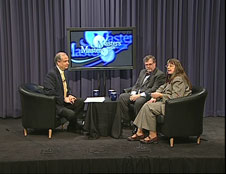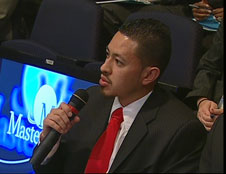May 28, 2010 Vol. 3, Issue 5
The third Masters with Masters event explored the challenges and rewards of international collaboration with Mike Hawes and Lynn Cline.
Ed Hoffman, Director of the NASA Academy of Program/Project & Engineering Leadership, sat down with Mike Hawes, Associate Administrator of the Office of Independent Program Cost and Evaluation, and Lynn Cline, Deputy Associate Administrator for Space Operations Mission Directorate, to discuss insights about their careers, the International Space Station (ISS), and the future of international collaboration.

Ed Hoffman (left), Mike Hawes (center), and Lynn Cline (right) answer questions from the audience at Masters with Masters III. Credit: NASA
Hawes and Cline arrived at their present positions from very different paths. Hawes, a self-proclaimed “space cadet” since childhood, joined Johnson Space Center at the dawn of the Shuttle program. Cline, an undergraduate French major, turned a three-month co-op position in the International Affairs Office into a 35-year career at the agency.
Both emphasized the importance of mentors who saw qualities in them that they couldn’t see in themselves. Cline noted that she was often recruited for positions she hadn’t considered. Hawes agreed, noting that, “It’s not that you throw out the career planning—it’s just that you need to be flexible to realize that there are always multiple paths.”
As Deputy Associate Administrator for the ISS from 1999 to 2002, Hawes was responsible for coordinating and aligning engineering standards among the ISS’s international partners. This posed significant challenges because NASA’s engineering practices differed from those of some of their partners, which led to the need to build a common lexicon for concepts like “certification” or “verification.”

NASA First class member asks Lynn Cline a question about bringing Russia in as a partner on the ISS.
As NASA’s lead negotiator with the international partners for the ISS, Cline learned to manage differences in culture (Americans tend to be workaholics) and planning (Japan’s fiscal year begins in April) as well as tectonic shifts in geopolitics (such as the dissolution of the Soviet Union). She also had to juggle the needs of the original ISS partners (Canada, Europe, and Japan) with those of the Russians, who joined later.
“I think folks may forget that we originally operated the partnership for nine or ten years before we invited the Russians to join,” said Hawes. Even after the Russians came on board, it would be another five years before the first assembly mission. “[The] Station didn’t just start with an announcement by the president that we were going to do this program,” explained Cline. “There had been years of in advance with the partners to pave the way so that when the President made such an announcement, they’d be prepared to accept the invitation.”
Hawes and Cline agreed that the future of space exploration will demand collaboration. Final assembly and utilization of ISS is a fundamental interest of NASA and its international partners, Hawes noted. Beyond ISS, international collaborations will most likely include robotic precursor missions or technology demonstrations. “As you look beyond…this administration has a strong emphasis on international cooperation,” said Cline. “I think NASA is going to be looking to see what interests other partners have… [and find] ways to work together to pool our resources as we plan for future exploration.”
Watch the NASA TV video of this Masters with Masters event below, or view clips of it on YouTube.





